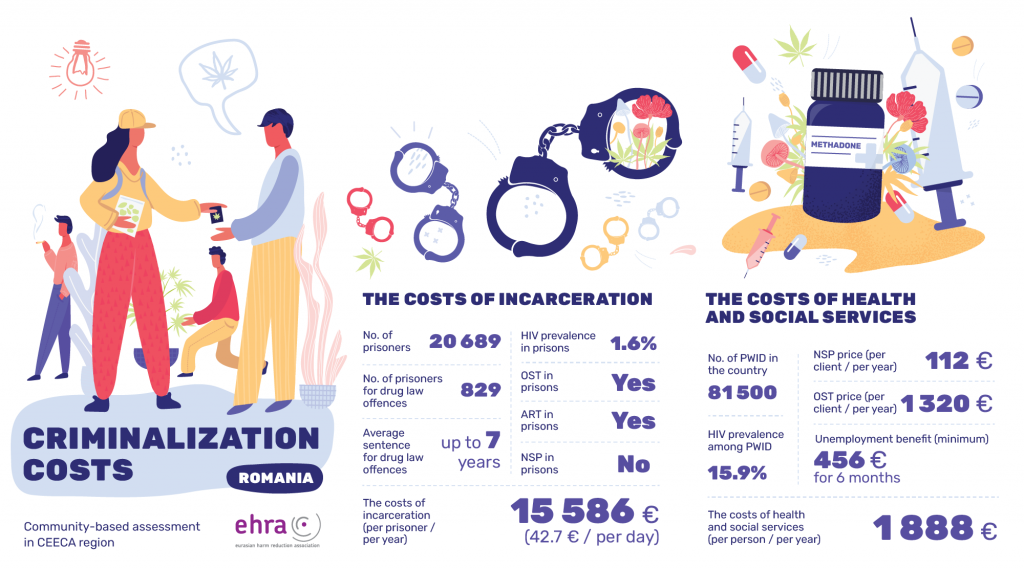There were 20,689 prisoners in Romania in 2019, of which 829 were incarcerated for drug law offences [1] which, since 2014, have been linked to the type of drug, with higher penalties being imposed for offences related to drugs considered ‘high risk’. The legislation also distinguishes between users and those who are drug dependent, based on a diagnosis. Drug consumption is illegal, but no punishment is specified in law. In the case of possession for personal use, the court can impose a fine or a prison sentence of 3 months to 2 years, or 6 months to 3 years, depending on the type of drug. A drug user who is convicted of any of these offences can avoid punishment by agreeing to attend an integrated assistance programme; the consent of the drug user is a prerequisite for inclusion in the programme, as defined in the Criminal Code of 2014 [2]. HIV prevalence among prisoners in Romania was estimated in 2015 as being 1.6% [3] and antiretroviral therapy (ART) is reportedly available, as is opioid substitution therapy (OST); however, needle/syringe programmes (NSP) are not available in any prisons [4].
The Government of Romania spends €15,586 in support of each prisoner, per year, or €42.70 per day [5].
Nationwide, there were estimated to be 81,500 people who inject drugs in Romania in 2020 [6], of which there are thought to be approximately 9,000 in the capital, Bucharest [7]. Self-reported HIV status among drug treatment clients suggests that around 16% reported to be HIV positive. However, self-reported prevalence is likely an underestimate as some drug users might not know their status. The 2017 seroprevalence study in Bucharest found that 30% of people who inject drugs were HIV positive and the national prevalence to be 15.9% [8]. NSP costs around €112 per client, per year, and OST costs about €1,320 per client, per year, for methadone [9]. Unemployment benefit is paid every month for a period of between 6 and 12 months with the amount based on the length of the completed period of contributions to the unemployment insurance system; the amount paid is around €456 per person that covers a period of 6 months, or €76 per month [10].
Whereas the Government of Romania spends €15,586 per year to keep a drug user in prison, it only costs around €1,888 per year to provide support to one person who injects opioids in community settings, a saving of €13,696 per person, per year. By decriminalising drug use and possession, the Government of Romania could save up to €11.4 million in total every year.
[1] Aebi MF, Tiago MM. SPACE I – 2019 – Council of Europe Annual Penal Statistics: Prison populations. Strasbourg; Council of Europe, 2020. https://wp.unil.ch/space/files/2021/02/200405_FinalReport_SPACE_I_2019.pdf (accessed 4 August 2021).
[2] European Monitoring Centre for Drugs and Drug Addiction (EMCDDA). Romania Country Drug Report 2019. Luxembourg; Publications Office of the European Union, 2019. https://www.emcdda.europa.eu/system/files/publications/11350/romania-cdr-2019_0.pdf (accessed 9 August 2021).
[3] Joint United Nations Programme on HIV and AIDS (UNAIDS). The Key Populations Atlas. Geneva; UNAIDS. https://kpatlas.unaids.org/dashboard (accessed 3 August 2021).
[4] Harm Reduction International (HRI). Global State of Harm Reduction 2020, Regional Overview 2.2 Eurasia. London; HRI, 2021. https://www.hri.global/files/2020/10/26/Global_State_HRI_2020_2_2_Eurasia_FA_WEB.pdf (accessed 3 August 2021).
[5] Aebi M F, Tiago MM. SPACE I – 2020 – Council of Europe Annual Penal Statistics: Prison populations. Strasbourg; Council of Europe, 2021. https://wp.unil.ch/space/files/2021/04/210330_FinalReport_SPACE_I_2020.pdf (accessed 3 August 2021).
[6] HRI, Ibid.
[7] EMCDDA, Ibid.
[8] EMCDDA, Op.cit.
[9] Information submitted by national partners.
[10] Directorate-General for Employment, Social Affairs and Inclusion. Romania – Unemployment insurance benefit. Brussels; European Commission, undated. https://ec.europa.eu/social/main.jsp?catId=1126&langId=en&intPageId=4758 (accessed 9 August 2021).

